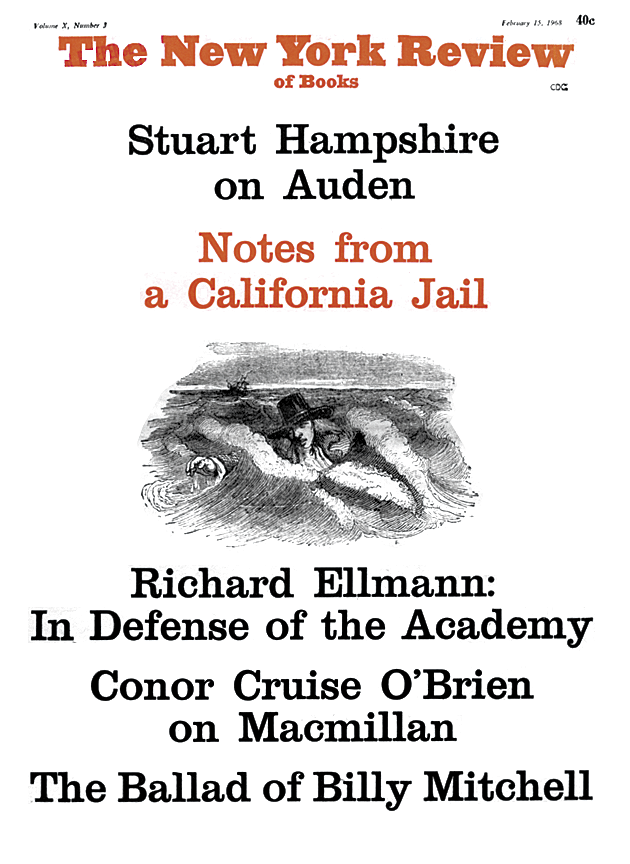To the Editors:
…Ronald Steel’s failure to review the European scene and to discuss the problem of the coup in that context, has allowed him to ignore one of the most serious implications of the Greek coup for US foreign policy. Greece may well become the focal point for European discontent with US foreign policy, much as Vietnam has become such a focal point domestically. Most European governments have taken a strong stand against the coup. While the British Labour Government is conspicuously absent from this roster of anti-fascists, the last Labour Party conference was very strong in demanding a more principled stand on the part of Wilson and Brown. Denmark has withdrawn its Ambassador from Greece, and Norway has requested the exclusion of Greece from NATO. The European Socialist parties have not only protested vigorously, but they seem to be moving to the point of more concrete actions against the Greek regime. Even more important are the actions of the Council of Europe, which has summoned the regime to restore parliamentary conditions and the European Commission on Human Rights which has accepted a plea from the Scandinavian governments concerning violations of individual freedom in Greece. The next meeting of the Council of Europe is expected to vote the exclusion of Greece. The European Common Market has already suspended a developmental loan to Greece, and it is likely that the next Common Market meeting will vote to terminate Greece’s status as an associate member.
Finally, and perhaps most relevant to the crisis in US foreign policy, the issue of Greece has been raised within NATO. TWO NATO members refused to participate in the recent NATO “Sunshine Express” exercises because of the participation of Greece, and the Norwegian Foreign Minister has informed the Norwegian Parliament of Norway’s intention to raise the question of Greece’s continued membership in NATO, with the implied threat of the withdrawal of Norway. British and Italian reactions resulted in the refusal of these two countries to send delegations to the Fourth International Conference on Political Law in September because it was held in Greece. The usually pro-US European governments are deeply concerned over the Greek crisis, both because they feel, unlike Mr. Steel, that this is the first postwar fascist regime to be established in Europe, and because NATO has been seriously compromised by the fact that the coup used a NATO-designed counter-insurgency plan as the blueprint for its success.
Perhaps most important for us is the significance of the developments in Greece for US foreign policy, and it is this concern which has led us to take issue with Mr. Steel. His definition of the situation and his limited knowledge of the key groups within the present regime and outside of it, coupled with a minimization of the European reaction to the regime, have made his article an acceptance—a critical one, but nevertheless an acceptance—of the present regime as stable and capable of economic reforms. While the critical aspect of his article clearly places him in the camp of liberal-humanists, his conclusions would be sufficient to convince the US government that support of the colonels is a viable choice. As Mr. Steel says, the colonels are pro-NATO. He ignores the fact that NATO may not be pro-colonels….
The Johnson Administration seems to have opted for the conclusions concerning stability of the Greek regime put forward by Mr. Steel. Their strategy has been to apply minimal pressures, in an effort to maintain this stability but to shift it toward the Monarchy and toward inclusion of the more traditional conservatives. This policy is again reminiscent of efforts to make the Diem regime “reform conscious.”… While some heavy arms shipments have been curtailed, the US has not used its NATO control powers over the daily supply of gasoline to the Greek armed forces to achieve any major change in the regime. It has not even been able to prevent the purge of the top naval and air force personnel loyal to the king, and top-ranking Army and Gendarmarie personnel loyal to the king, but not part of the Colonel’s clique. For all practical purposes, the US is supporting the present regime. But if the regime is as unstable as we claim, and as repulsive to our European allies as they have stated, this policy of “realism” will become increasingly unrealistic.
…As Papadopolous consolidates his power, non-military and non-revolutionary options will be precluded; while the rising expectations of the Greek population created by a decade of solid economic development and heightened tourism will demand not the stagnation resulting from the economic policies of the regime, but continued or renewed development. The more Greek politics become polarized, the more the growing economic crisis in Greece will necessitate a positive response from the US. The United States will then feel forced to give increasing assistance to the regime as an alternative to political dislocation and radicalization of Greek society. To sustain that regime will require not only sizable military assistance from the US, but equally substantial economic aid. In short, Greece is potentially the Vietnam of Europe, and unlike Mr. Steel and the present US Administration, the Europeans seem to realize this.
We believe that there is still time to alter this course of events. Through economic sanctions, such as discouraging US tourists to Greece, US trade with Greece, and certainly US aid to Greece the present US Administration could not only guarantee a return to Democracy in Greece but could prevent a repetition in Europe of the Vietnam or Dominican crisis. The difference in the conclusions that we have drawn from those of Mr. Steel are not based on his loving democracy less, but on our knowing Greece more. The difference in US policy that would result from a policy based on his conclusions or ours would thus be absolute.
Athan Theoharis
Dept. of History
Wayne State University
Otto Feinstein
Dept. of International Relations
Wayne State University
Detroit, Michigan
This Issue
February 15, 1968


